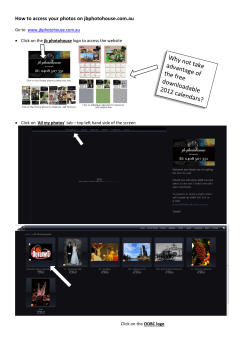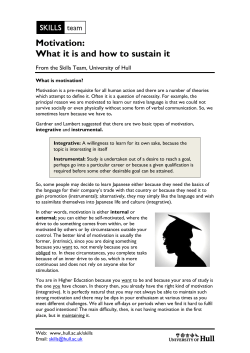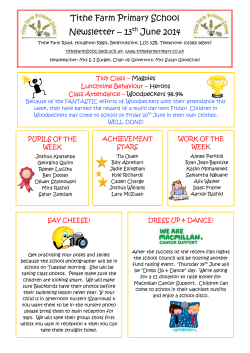
Document 160022
For more information contact: Chuck Calahan calahanc@purdue.edu When you have knowledge of cultural worldview frameworks, you can understand the elements important to members of another culture. These elements can relate to the culture’s history, values, politics, communication styles, economy, beliefs, and practices. In this assignment you are required to look up the answers to the following topics on the country or countries you will be visiting. In addition to writing the answers as a Word document or other file to these topics, please provide images from the Internet, links or websites to add clarity to your learning. For example, the first topic is the name of the head of state, perhaps the president, king, queen, etc. Please look up an image of this person and insert it into your Word document or other file. The following list of topics comes from pages 129 -130 in Preparing to Study Abroad: Learning to Cross Cultures by Steven T. Duke. This fun and easy to read book is highly recommended reading. High (2) Med (1) Low (0) Responses Completely answered all topics Completely answered most topics Incompletely answered all or most topics Images, photos or links Provided for most topics Somewhat provided Rarely provided Stephen R. Covey Stephen R. Covey For the country or countries you will visit, what are the: Political Systems Name the head of state (president, king, queen, etc.) and the prominent members of his or her family (include images or photos) Names of other key government leaders (prime minister, foreign minister, minister of internal affairs, etc. (include images or photos) Format and function of the national government and national legislature Names of major political parties Sports and Exercise Name of the sports leagues and teams located in the city or region you will visit (include images, photos, and websites) Colors, emblems, and logos of those sports teams (include images) Common forms of exercise among the general population (include photos) Languages and Ethnic groups Names of the major ethnic groups Rough proportion of the population that speaks a dominant language Name of the mayor or leader of the city where you will stay (include image or photo) What are the dominant language and the non-dominant languages of the country or countries you will visit? (include a link to a video of persons speaking these languages) Are national elections held, how frequently, and when was the last election Languages used to conduct official business and why Religions and faith Traditions Names of leaders of major religions or faith systems (include images or photos) Languages taught most commonly in schools and why Holidays Key beliefs or traditions (include images or photos) Name of major holidays and when they take place (include images or photos) What each religion or faith tradition teaches regarding life, death, and interaction with others How do people generally celebrate these holidays? (include images or photos) Economy Names of major companies that operate in the country or countries you will visit and what they produce (include links to websites) Major exports or imports common predictions for how well the economy will perform in the next few years What are the meanings of these holidays? Common foods, music, art associated with those holidays (include images and photos) Music and Art Names of major artists and musicians (include images or photos) Names of famous artists whose works appear in museums or art galleries (include images of photos) INTERCULTURAL KNOWLEDGE AND EFFECTIVENESS RUBRIC Definition A set of behaviors, attitudes, and policies that come together to enable systems, agencies, or professionals to work effectively in cross-cultural situations. Proficient Emerging Developing 3 2 1 Knowledge Articulates insights into own cultural rules Recognizes new perspectives about own Identifies own cultural rules and biases (e.g. Cultural self- awareness and biases (e.g. seeking complexity; aware cultural rules and biases (e.g. not looking for with a strong preference for those rules of how her/his experiences have shaped sameness; comfortable with the shared with own cultural group and seeks these rules, and how to recognize and complexities that new perspectives offer.) the same in others.) respond to cultural biases, resulting in a shift in self-description.) Demonstrates sophisticated understanding Demonstrates adequate understanding of Demonstrates partial understanding of the Knowledge of the complexity of elements important to the complexity of elements important to complexity of elements important to Knowledge of cultural members of another culture in relation to members of another culture in relation to members of another culture in relation to its history, values, politics, communication its history, values, politics, communication its history, values, politics, communication worldview frameworks styles, economy, or beliefs and practices. styles, economy, or beliefs and practices. styles, economy, or beliefs and practices. Skills Interprets intercultural experience from the Recognizes intellectual and emotional Identifies components of other cultural Empathy perspectives of own and more than one dimensions of more than one worldview perspectives but responds in all situations worldview and demonstrates ability to act and sometimes uses more than one with own worldview. in a supportive manner that recognizes the worldview in interactions. feelings of another cultural group. Skills Articulates a complex understanding of Recognizes and participates in cultural Identifies some cultural differences in verbal Verbal and cultural differences in verbal and nonverbal differences in verbal and nonverbal and nonverbal communication and is aware nonverbal communication communication (e.g., demonstrates communication and begins to negotiate a that misunderstandings can occur based on understanding of the degree to which shared understanding based on those those differences but is still unable to people use physical contact while differences. negotiate a shared understanding. communicating in different cultures or use direct/indirect and explicit/implicit meanings) and is able to skillfully negotiate a shared understanding based on those differences. Attitudes Asks complex questions about other Asks deeper questions about other cultures Asks simple or surface questions about Curiosity cultures, seeks out and articulates answers and seeks out answers to these questions. other cultures. to these questions that reflect multiple cultural perspectives. Attitudes Openness Initiates and develops interactions with culturally different others. Suspends judgment in valuing her/his interactions with culturally different others. Begins to initiate and develop interactions with culturally different others. Begins to suspend judgment in valuing her/his interactions with culturally different others. Expresses openness to most, if not all, interactions with culturally different others. Has difficulty suspending any judgment in her/his interactions with culturally different others, and is aware of own judgment and expresses a willingness to change. Adapted from AAC&U Core Value Rubrics
© Copyright 2025





















